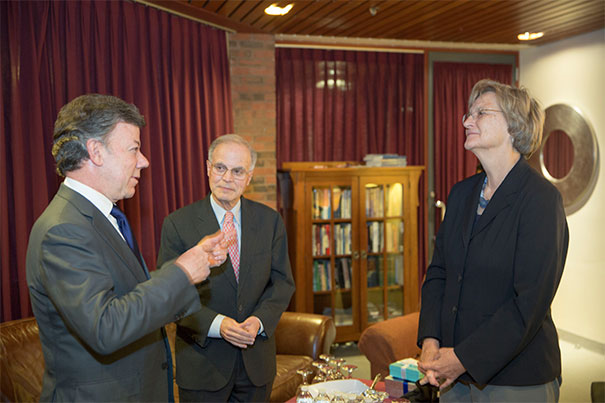
During his 2013 address at Harvard, Juan Manuel Santos, president of Colombia (from left), spoke to Jorge I. Domínguez, Antonio Madero Professor for the Study of Mexico, and Harvard President Drew Faust. Santos was awarded the 2016 Nobel Peace Prize this morning.
File photo by Kris Snibbe/Harvard Staff Photographer
Juan Manuel Santos, Kennedy School alumnus and Nieman fellow, wins Nobel Peace Prize
Colombian president honored for his efforts to end 50-year-long civil war
Colombian President Juan Manuel Santos was awarded the Nobel Peace Prize today for his work to end the 52-year civil war between the Colombian government and the Revolutionary Armed Forces of Colombia, a Marxist guerilla group also known as FARC. The war, which has left 220,000 dead and displaced nearly 6 million people, is the longest-running remaining major armed conflict in the Americas.
Santos, 65, earned a mid-career/master’s in public administration in 1981 from Harvard Kennedy School (HKS) and was a 1988 Nieman Fellow for his award-winning work as a columnist and reporter for the Colombian newspaper El Tiempo.
Santos, who pledged to end the war when first elected president in 2010, “has brought the bloody conflict significantly closer to a peaceful solution, and much of the groundwork has been laid for both the verifiable disarmament of the FARC guerrillas and a historic process of national fraternity and reconciliation,” the Norwegian Nobel Committee said in a statement Friday.
In late September, the two sides reached a landmark peace accord that was narrowly rejected by voters in a nationwide referendum last week.
Despite that setback, the committee said it hoped the award would encourage Colombians to respect the current ceasefire and cause peace talks to continue. “The fact that a majority of the voters said no to the peace accord does not necessarily mean that the peace process is dead. The referendum was not a vote for or against peace. What the ‘no’ side rejected was not the desire for peace, but a specific peace agreement.”
Although Santos was selected for his individual efforts, the committee said “the award should also be seen as a tribute to the Colombian people who, despite great hardships and abuses, have not given up hope of a just peace, and to all the parties who have contributed to the peace process. This tribute is paid, not least, to the representatives of the countless victims of the civil war.”
“I was very proud to hear this morning of President Juan Manuel Santos’s receiving the Nobel Peace Prize,” said HKS Dean Douglas Elmendorf. “This incredible recognition speaks to the tremendous leadership and vision he has shown in negotiating a peaceful solution to his country’s long and difficult civil war. His courage should be an inspiration to the Colombian people and to the rest of the world.”
Santos returned to speak at the Kennedy School in 2010 and 2013. During his 2013 address, he described the great strides Colombia had made in the recent years in education, infrastructure, in erasing the country’s deficit, and in narrowing the nation’s wide income gap between rich and poor.
“We broke a trend,” he said. describing the inequality gap that has persisted in Colombia for centuries. Income for the poor, he said, was rising six times faster than it has for those in Colombia’s upper strata.
Before entering politics, Santos was a celebrated journalist. Two of his Nieman colleagues lauded his choice as Nobel winner and recalled some of their times with him.
Rosental Alves, now the director of Knight Center for Journalism in the Americas at the University of Texas at Austin, said, “He was a journalist, but somehow he was different from us. Sometimes we joked this guy one day will become president of Colombia. It was kind of the class joke. A couple of decades later, sure enough he was and is the president of Colombia. I told him this when we met … in the presidential office there, and of course he laughed.”
Another former colleague, Eugene Robinson, Pulitzer Prize-winning columnist at the Washington Post, said that “Juan Manuel became a great friend during our year at Harvard, and our friendship continued uninterrupted right after the Nieman year when he went back to El Tiempo, and I went to Buenos Aires as the Post’s South America correspondent. This was the era of the Colombian drug lords, so I had to go to Bogota a lot. Juan Manuel had some executive position at the paper. On one of my first trips to Colombia, he arranged a lunch in the countryside for me and invited all the young movers and shakers in Colombian politics, along with the U.S. ambassador. It was one-stop shopping. In one trip I knew all the important up-and-comers from all sides of the political spectrum.”
Colombian President Santos on Rebel Negotiations and the War on Drugs | PolicyCast
Colombian President Juan Manuel Santos, a Kennedy School alumnus, speaks about the importance of negotiating with rebel groups that have been fighting the Colombian government for more than 50 years; what progress has been made in those negotiations; whether FARC could become a legitimate political party; if the international community has forgotten about the war on drugs; and if that war is winnable. You can hear more from Santos in his address at the JFK Jr. Forum, sponsored by the Institute of Politics.




